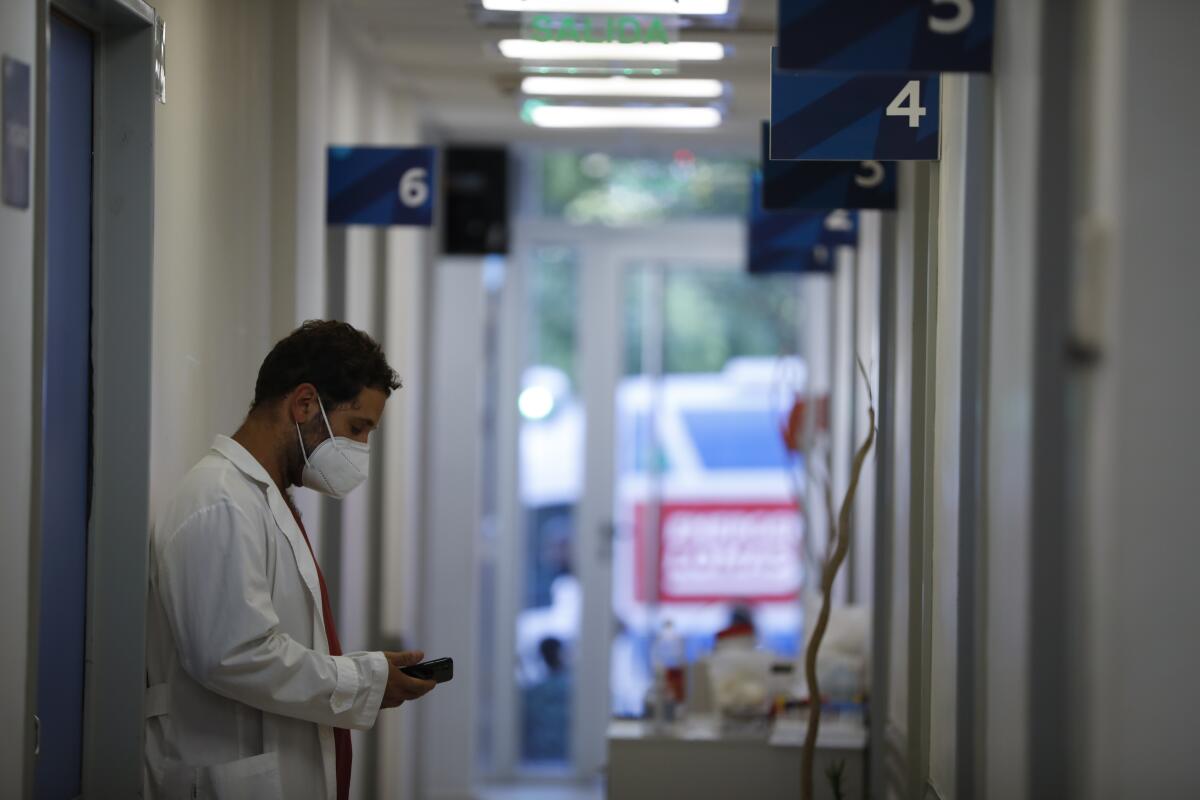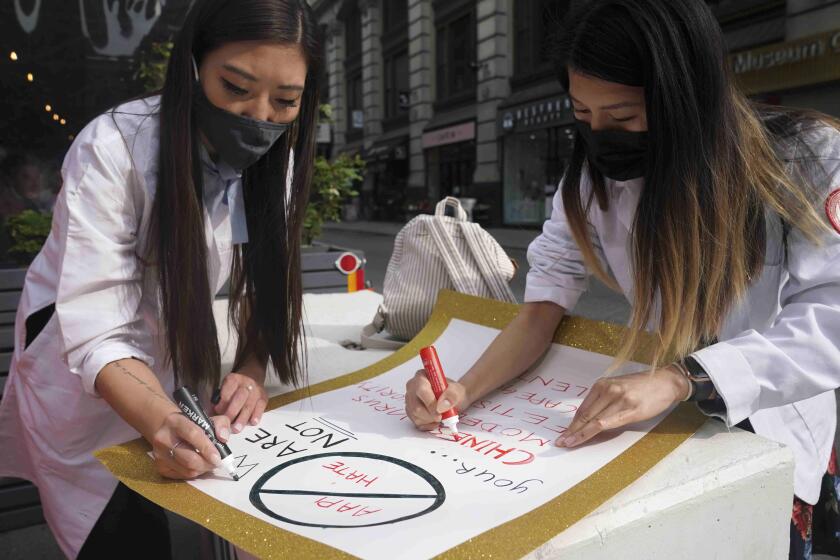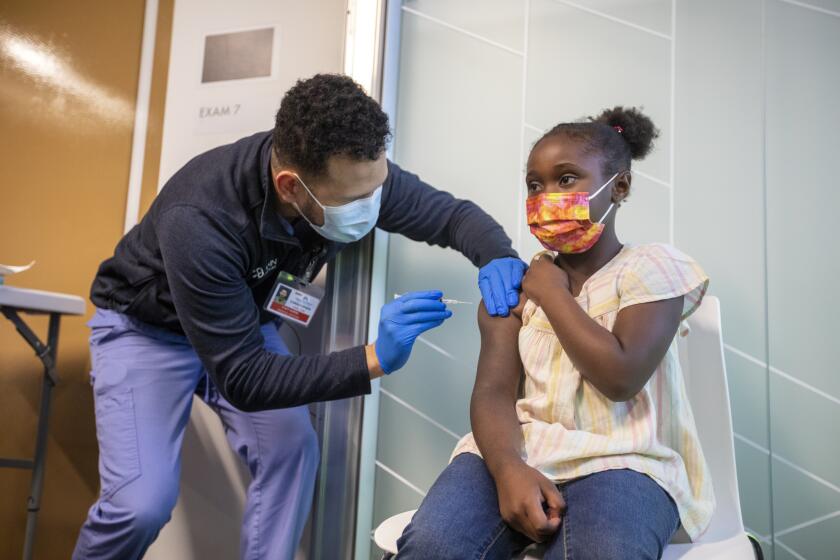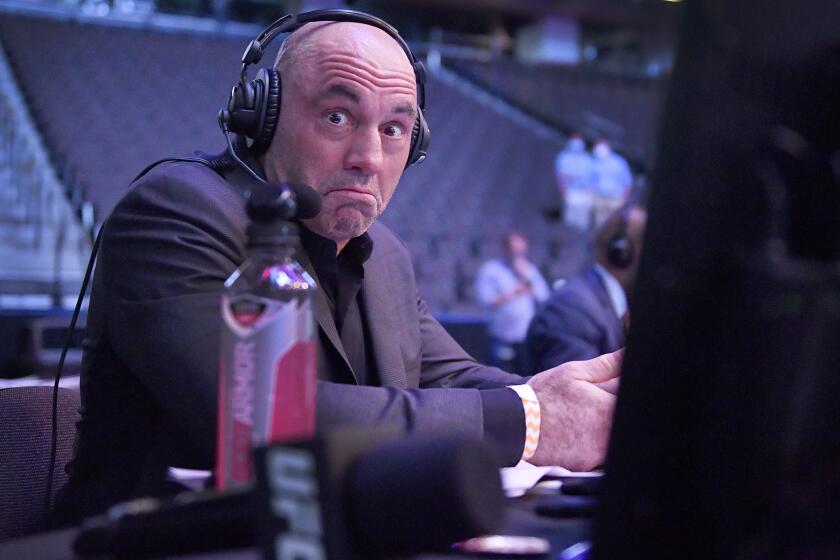‘I have over 30 threats to rape, kill, or assault me’: Being a doctor on social media

- Share via
It began with life-saving advice in the midst of the pandemic. It ended with death threats.
“When I posted a picture of myself with my badge in my white coat after my COVID-19 vaccination I received hundreds of harassing anti-vaxx messages including death threats.”
The medical professional on the receiving end of those threats was hardly alone. A new survey of physicians and biomedical scientists in the U.S. found that nearly two-thirds experienced harassment on social media during the COVID-19 pandemic.
Pro-vaccine messages were a common target of online vitriol. So were posts that endorsed the use of face masks or promoted public health in general. Survey respondents said they also provoked ire by advocating for abortion access and firearm safety, researchers reported in the journal JAMA Network Open.
“[I] have been encouraged to commit suicide during a debate on gun violence and restrictions.”
The harassment came in many forms. In addition to violent threats, the doctors and scientists said, their medical practices were slammed with bogus patient reviews, their attackers campaigned to get them fired, their personal information was shared online, and their faces were pasted onto photos of porn models.
Asian Americans in healthcare feel the jarring anguish of being racially targeted because of the coronavirus while working to save people from it.
Researchers used Twitter to invite physicians, biomedical researchers and trainees to take the anonymous social media survey in the summer of 2022, when the pandemic had largely receded into the background. Among the 359 respondents, 81% were between the ages of 25 and 54, 57% were women, 28% were people of color, and 21% identified as a gender or sexual minority.
In almost every demographic, more than half of the respondents reported online harassment of some kind. The exceptions were people 65 and older (44% of them experienced online harassment) and people who didn’t discuss public health issues on their social media accounts (39% were harassed anyway).
Biomedical professionals had been using social media for years before the pandemic came along, said study co-author Dr. Tricia Pendergrast, a first-year resident in anesthesiology at the University of Michigan. The platforms helped them raise their profiles, tout their research, attract collaborators and spread beneficial health messages to the public.
Some survey respondents said the pandemic prompted them to spend more time on social media in order to spread factual information, as the U.S. surgeon general encouraged them to do.
“Prior to the pandemic social media was just me goofing off. As misinformation grew, I found myself consistently tweeting out information or retweeting tweets to correct misinformation. Of course, that led to increased harassment, especially as a Black woman scientist.”
Dr. Vineet Arora, the dean for medical education at University of Chicago Medicine, said the harassment was prompted in part by the frequent updating of expert advice.
“As [researchers] have learned more about the pandemic, changes to protocols have been made, and I think there’s been a lot of confusion around that,” said Arora, the study’s senior author.
The CDC has updated its COVID-19 guidance in an effort to make things less confusing to Americans. Here’s what the agency recommends.
Arora said she believes the rapid shifts in research and safety recommendations made it easy for misinformation to spread and for people to lose confidence in those with medical expertise. Their frustration grew into anger directed at physicians, scientists and medical professionals, mainly through social media platforms.
“I have over 30 threats to rape, kill, or assault me posted to Twitter, Reddit, and private websites. I have lost count of the number of law enforcement reports I have made, but the accounts that make the most direct threats are always anonymous.”
Though the pandemic has escalated harassment against doctors and scientists, it certainly didn’t create it. A survey of U.S. physicians conducted in early 2019 found that 23% experienced some form of online harassment in response to their public health advocacy. In the new survey, 66% of doctors and scientists reported harassment of some kind.
The pandemic may be largely over, but the abuse is sure to continue, Pendergrast said. There are plenty of other polarizing issues related to medical care, including abortion access and gender-affirming care, she noted.
“[I] would be very reluctant using public account to take controversial positions as I don’t want work censure or to be harassed at home or in my private life. I have small kids at home to protect.”
The targeting of marginalized groups is of particular concern, “especially at a time when their voices are needed most,” said Pendergrast, who was a medical student at Northwestern University when the survey was conducted. She fears that unless institutions or social media companies intervene, the harassment will continue.
“How do we invite these groups into these spaces, knowing it’s not safe for [them] to be there?” she said. “It is really frustrating that this is the case right now.”
Joe Rogan, Robert F. Kennedy Jr. and other anti-vaccine conspiracy-mongers keep insisting that experts debate them in public. The experts are right to refuse.
Continued harassment of medical professionals may drive people from the field altogether, said Heidi Tworek, director of the Centre for the Study of Democratic Institutions at the University of British Columbia, who was not involved with the study.
Almost half of U.S. healthcare workers reported experiencing burnout during the pandemic, and a majority have seriously considered leaving — or have left — the medical field, Tworek said. In another ominous sign, the number of students applying to emergency medicine programs in the U.S. has plunged 26% in the last two years, according to the National Resident Matching Program.
“A lot of medical students watched their advisors, mentors and colleagues put themselves at risk on the front line of COVID and were then met with such anger, violence and harassment,” Pendergrast said. “It affected all of us.”
In an unsurprising development, the study authors received harassing comments on Twitter after their research was published.
“No one is safe from online harassment,” said study leader Dr. Regina Royan, an emergency physician at Northwestern University.










